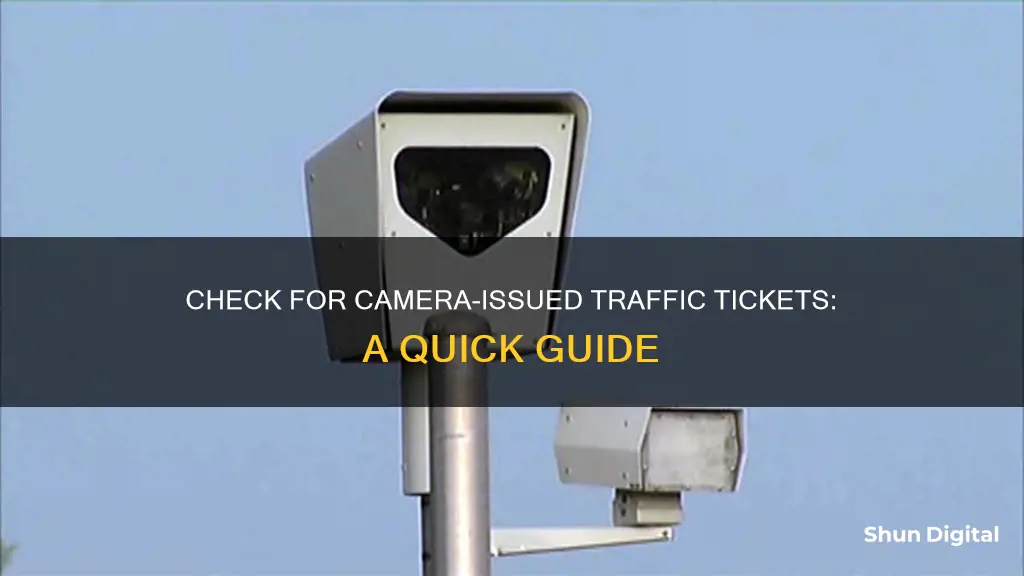
If you're concerned about receiving a ticket from a red light camera, there are several ways to find out. The most straightforward method is to wait for the ticket to arrive in the mail, which typically occurs within 30 to 60 days, though it can arrive sooner. However, if you're not the registered owner of the vehicle or have recently moved without updating your address, the ticket may never reach you. Alternatively, you can search online databases of the jurisdiction where the incident occurred, using your license plate number or ticket number if you have it. Speaking with the local police or calling organisations like American Traffic Solutions (ATS) can also help you determine if you have any outstanding violations. Additionally, checking your driver's license on the License Check website provided by the DMV can reveal any red light tickets associated with your license.
| Characteristics | Values |
|---|---|
| How to check if you've received a camera ticket | Check your driver's license on the License Check website provided by the DMV; call the local courthouse; call American Traffic Solutions (ATS) |
| How to check if you've received a red light camera ticket | Wait to receive a ticket in the mail; search online databases; speak with the local police; speak with the vehicle's owner |
What You'll Learn

Check your driver's license online
Checking your driver's license status online is a convenient way to stay up-to-date with your driving record. The process may vary depending on your location, but here is a general guide:
Checking Your Driver's License Status
To check your driver's license status online, you can visit the website of your local Department of Motor Vehicles (DMV) or an equivalent state agency, such as the Department of Public Safety or the Department of Revenue. These websites often provide online tools that allow you to check the current status of your driver's license. This information may include whether your license is valid, suspended, or cancelled.
Obtaining Your Driving Record
While checking your driver's license status will provide basic information, obtaining your driving record will give you more detailed insights. Your driving record contains a history of traffic law violations, convictions, fines, and points associated with your license. You can usually request this record online from the DMV or the relevant state agency.
Understanding Points and Suspensions
Many states use a points system to evaluate your driving history. Speeding tickets, traffic violations, and other infractions can result in points being added to your record. Accumulating too many points may lead to your license being suspended for a specific period. Therefore, it is important to periodically check your driving record to monitor your points and address any concerns promptly.
Address Changes and Replacements
In addition to checking your license status, many online services allow you to update your address or emergency contacts, and even request a replacement license if yours is lost, stolen, or damaged. These services can often be accessed through the same websites that provide license status checks and driving record requests.
Fees and Limitations
It is important to note that most states charge a small fee to access your driving record. While some states may offer a free copy of your driver record, this is not always the case. Be cautious of websites or services claiming to offer completely free checks, as they may provide limited information or attempt to sell you additional products.
By following these steps and staying informed about your driving record, you can ensure you are compliant with any legal requirements and take appropriate action if any issues arise.
Upgrading Your DJI Phantom 3: Camera Battery Replacement Guide
You may want to see also

Contact your local courthouse
If you are concerned about receiving a camera ticket, one of the best things you can do is contact your local courthouse. They will be able to provide you with specific information about any violations you may have committed and guide you through the necessary next steps.
When you get in touch, be sure to have your driver's license number, vehicle plate number, or citation number ready, as this will help the courthouse staff to quickly locate any relevant information. They may ask you a series of questions to narrow down the search, such as the date and location of the incident, so try to have as much detail as possible to hand.
The courthouse should be able to tell you about any outstanding fines or penalties associated with the camera ticket. They can also advise you on how to proceed in terms of paying the fine, contesting the ticket, or requesting a hearing. Each of these options may have different requirements and deadlines, so it's important to get official guidance.
In some cases, the courthouse may direct you to another local authority, such as the police department or transportation authority, especially if your ticket was related to a red light or school zone camera. These departments often handle the installation and operation of such cameras and may be better equipped to answer your queries.
Remember, it's always best to take a proactive approach and reach out as soon as possible. Dealing with any potential issues early on can help prevent further complications, such as license suspension or increased fines.
Where Does Your Device Store Camera Raw Presets?
You may want to see also

Call American Traffic Solutions (ATS)
If you're unsure whether you've received any camera tickets, one option is to call American Traffic Solutions (ATS). ATS is a US-based firm that produces red-light cameras and other traffic safety technologies.
As of 2011, ATS has contracts with 275 governmental bodies and supplies 40% of automated traffic law enforcement systems across the United States. ATS is also the market leader in road safety camera installations in North America, with over 3,200 installed red-light, speed, and school bus stop arm safety cameras serving more than 30 million people.
Many cities in Florida use ATS (now rebranded under Verra Mobility Corporation) to process traffic violations. You can reach ATS at 1-866-225-9975. When you call, you will need to provide your name and license plate number so that they can check if you have any red-light tickets. If you have received any citations, it is your responsibility to note and record the citation number and date of the ticket.
Keep in mind that ATS has been criticised for the questionable effectiveness of its red-light cameras, its aggressive lobbying efforts, and its controversial involvement in local politics.
Understanding Fujifilm's Unique "IS" Mode
You may want to see also

Search online databases
If you're unsure whether you've received a camera ticket, one of the best things you can do is search online databases. This method is often more reliable than waiting for a notice in the mail, as postal services can be unreliable, especially if you've recently moved.
In the US, the process for checking online databases for camera tickets varies depending on the state. For example, in Florida, you can enter your driver's license number on the License Check website provided by the Florida DMV. This will allow you to see if you have any red light tickets listed against your license. Florida also has 485 active red light cameras, and many cities in the state use American Traffic Solutions (ATS), rebranded under the Verra Mobility Corporation, to process traffic violations. You can call ATS at 1-866-225-9975 and provide your name and license plate number to check for any red light tickets.
In California, you can check for red light camera tickets by visiting your county court's website and searching using your driver's license, vehicle plate, or citation number. If you haven't received a notice in the mail and can't find any information online, you can contact the traffic court in the county where the incident occurred for further assistance.
It's worth noting that not all states in the US use red light cameras, and even within a state, not all signals have red light cameras. However, states with red light cameras often have them installed in urban areas and at dangerous intersections with a higher percentage of crashes due to violations.
Charging a VTech Camera: A Step-by-Step Guide
You may want to see also

Speak with the local police
If you're concerned about receiving a camera ticket, one of the best things to do is to speak with your local police department. They can provide you with specific information about the laws and procedures in your area. Here's a step-by-step guide on what to do:
- Locate Your Local Police Department: Start by finding the contact information for your local police department. You can usually find this information on your city or town's website, or by searching for " [Your City/Town] Police Department" online.
- Make Contact: Once you have their contact information, you can reach out to them. Depending on their preferences and your comfort level, you can call them, send an email, or even visit their station in person during business hours.
- Explain Your Concern: When you make contact, explain that you are concerned about the possibility of receiving a camera ticket and would like to know if you have any outstanding violations. Be prepared to provide them with your full name, driver's license number, license plate number, and any other relevant information.
- Ask About Checking for Tickets: Inquire about the process for checking if you have received any camera-issued tickets. Ask if they have an online system you can check, or if they can look up that information for you. Sometimes, police departments have websites or systems where you can search for outstanding violations using your license or plate number.
- Understand the Appeal Process: If you have received a ticket, ask the police department about the process for appealing it. There may be specific procedures or deadlines you need to be aware of. Find out if you can dispute the ticket, and what evidence you might need to provide.
- Inquire About Prevention: Take this opportunity to ask about how you can avoid receiving camera tickets in the future. They may be able to provide you with information about the locations of red light cameras or speed cameras in your area, as well as any relevant traffic laws or regulations.
- Follow Up: If necessary, follow up with the police department or relevant authorities to address any outstanding tickets or concerns. Make sure to take note of any reference or case numbers associated with your inquiry, as this will help streamline future communications.
Remember, your local police department is there to serve the community, and they should be able to provide you with accurate and timely information about camera tickets and traffic violations. Don't be afraid to reach out and ask for their assistance.
Bridge Cameras: Can They Shoot RAW?
You may want to see also
Frequently asked questions
A red light camera is a type of traffic enforcement camera that captures or records an image of a vehicle that has entered an intersection despite the traffic signal indicating red.
You will likely notice one or several camera flashes when you are caught by a red light camera. To check if you've received a ticket, you can visit your county court's website and search using your driver's license, vehicle plate, or citation number. You can also contact the traffic court in the county where the incident occurred.
It is important to take swift action to avoid further complications, such as a suspended license or excessive fines. You can choose to pay the fine, enrol in a driver improvement course, or contest the citation.
The cost of a red light camera ticket can vary depending on the location and any previous driving infractions. For example, in Florida, the base fine is $158, but it can increase to $262 if not paid promptly.
Failing to pay a red light camera ticket can result in additional fines, a suspended license, and other legal consequences. It is important to take these tickets seriously and address them in a timely manner.







